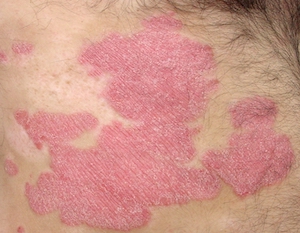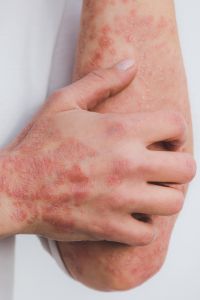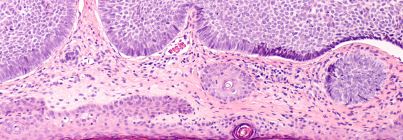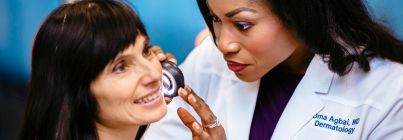Psoriasis
Comprehensive Care for Skin Plaques
 Psoriasis affects approximately 3% of the adult population in the United States, according to the National Psoriasis Foundation. It is a chronic skin condition that can occur over a large percentage of the body, but is usually found on characteristic sites such as the elbows, knees, nails and scalp. While psoriasis can run in families, it is not contagious and cannot be spread from person to person. The skin lesions are generally described as red (erythematous) plaques with a thick white scale.
Psoriasis affects approximately 3% of the adult population in the United States, according to the National Psoriasis Foundation. It is a chronic skin condition that can occur over a large percentage of the body, but is usually found on characteristic sites such as the elbows, knees, nails and scalp. While psoriasis can run in families, it is not contagious and cannot be spread from person to person. The skin lesions are generally described as red (erythematous) plaques with a thick white scale.
Psoriasis with classic symptoms is usually easy to diagnose. However, patients with atypical presentations may go undiagnosed for years, and a skin biopsy is sometimes needed for confirmation. Treatment can range from simple topical steroid creams to more advanced therapies, depending on disease severity. Treatments are tailored to each patient, and individuals with moderate to severe psoriasis may benefit from care by our board-certified dermatologists at UC Davis Health.
Causes of Psoriasis
Although the cause of psoriasis is still debated, psoriasis is likely a result of an abnormal immune response. Skin biopsies show a characteristic pattern of infiltration of white blood cells. This, in turn, causes abnormal skin growth. Specifically, the skin at psoriasis sites grows too rapidly, resulting in a scaly appearance. The skin also changes in other ways. For example, blood vessels approach the surface of the skin, resulting in easy bleeding when scales are picked or knocked off. Individuals with psoriasis often have a genetic predisposition for the disease, which is why it can run in families.
Types of Psoriasis
 Psoriasis can appear in several forms, each with distinct patterns and symptoms, ranging from common plaque psoriasis to less frequent types such as guttate or pustular psoriasis. It takes many forms, including:
Psoriasis can appear in several forms, each with distinct patterns and symptoms, ranging from common plaque psoriasis to less frequent types such as guttate or pustular psoriasis. It takes many forms, including:
- Classic Lesions — These occur on the scalp, elbow, knees, legs, arms, genitals, nails, palms and soles of the feet.
- Inverse Psoriasis — This type of psoriasis occurs in skin folds and has little scale, if any. It looks very different than classic psoriasis lesions.
- Guttate Psoriasis — This affects children and young adults and appears as numerous small lesions scattered over the body.
- Pustular Psoriasis — In addition to characteristic psoriatic lesions, this type includes pustules with thick purulent material (pus) and is often found on the palms of the hands.
- Psoriatic Arthritis — This type is found in 30% of individuals with psoriasis, according to the National Psoriasis Foundation. It does not respond to topical therapy.
Psoriasis Treatments
Psoriasis treatments range from topical creams and phototherapy to systemic medications, tailored to the severity of the condition and each patient’s individual needs.
Topical Therapies
- Steroids
- Vitamin D analogues such as Calcipotriene. (Note that ordinary vitamin D does not work.)
- Retinoids (Vitamin A analogues). Examples include creams such as tazarotene and oral medications such as isotretinoin and acitretin.
- Coal tar is an old, but still-used method.
Systemic Therapies
- Methotrexate is a chemotherapy agent that, when given in small doses, is very effective in treating psoriasis. It may also control the arthritis component of the disease seen in some individuals.
- Cyclosporine is a strong anti-inflammatory agent that can be very effective in treating psoriasis.
- Biologic therapies are among the newest treatment options for psoriasis and have received widespread attention. Although they can be costly, they are highly effective in managing the condition. Biologics work by targeting specific inflammatory factors or receptors on immune cells, helping to reduce the inflammation that leads to psoriasis symptoms.
Additional Therapies
- Light therapy for psoriasis uses natural sunlight or specialized ultraviolet (UV) phototherapy booths. These medical phototherapy booths are different from the UV light used in tanning salons.
Contact Us
For more information or to schedule an appointment, please call 916-734-6111 or 800-770-9282.


